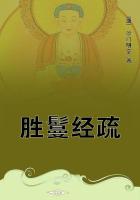Next for discussion after the subjects mentioned is Time. The best plan will be to begin by working out the difficulties connected with it, ****** use of the current arguments. First, does it belong to the class of things that exist or to that of things that do not exist?
Then secondly, what is its nature? To start, then: the following considerations would make one suspect that it either does not exist at all or barely, and in an obscure way. One part of it has been and is not, while the other is going to be and is not yet. Yet time-both infinite time and any time you like to take-is made up of these. One would naturally suppose that what is made up of things which do not exist could have no share in reality.
Further, if a divisible thing is to exist, it is necessary that, when it exists, all or some of its parts must exist. But of time some parts have been, while others have to be, and no part of it is though it is divisible. For what is 'now' is not a part: a part is a measure of the whole, which must be made up of parts. Time, on the other hand, is not held to be made up of 'nows'.
Again, the 'now' which seems to bound the past and the future-does it always remain one and the same or is it always other and other?
It is hard to say.
(1) If it is always different and different, and if none of the parts in time which are other and other are simultaneous (unless the one contains and the other is contained, as the shorter time is by the longer), and if the 'now' which is not, but formerly was, must have ceased-to-be at some time, the 'nows' too cannot be simultaneous with one another, but the prior 'now' must always have ceased-to-be.
But the prior 'now' cannot have ceased-to-be in itself (since it then existed); yet it cannot have ceased-to-be in another 'now'. For we may lay it down that one 'now' cannot be next to another, any more than point to point. If then it did not cease-to-be in the next 'now' but in another, it would exist simultaneously with the innumerable 'nows' between the two-which is impossible.
Yes, but (2) neither is it possible for the 'now' to remain always the same. No determinate divisible thing has a single termination, whether it is continuously extended in one or in more than one dimension: but the 'now' is a termination, and it is possible to cut off a determinate time. Further, if coincidence in time (i.e. being neither prior nor posterior) means to be 'in one and the same "now"', then, if both what is before and what is after are in this same 'now', things which happened ten thousand years ago would be simultaneous with what has happened to-day, and nothing would be before or after anything else.
This may serve as a statement of the difficulties about the attributes of time.
As to what time is or what is its nature, the traditional accounts give us as little light as the preliminary problems which we have worked through.
Some assert that it is (1) the movement of the whole, others that it is (2) the sphere itself.
(1) Yet part, too, of the revolution is a time, but it certainly is not a revolution: for what is taken is part of a revolution, not a revolution. Besides, if there were more heavens than one, the movement of any of them equally would be time, so that there would be many times at the same time.
(2) Those who said that time is the sphere of the whole thought so, no doubt, on the ground that all things are in time and all things are in the sphere of the whole. The view is too ***** for it to be worth while to consider the impossibilities implied in it.
But as time is most usually supposed to be (3) motion and a kind of change, we must consider this view.
Now (a) the change or movement of each thing is only in the thing which changes or where the thing itself which moves or changes may chance to be. But time is present equally everywhere and with all things.
Again, (b) change is always faster or slower, whereas time is not: for 'fast' and 'slow' are defined by time-'fast' is what moves much in a short time, 'slow' what moves little in a long time; but time is not defined by time, by being either a certain amount or a certain kind of it.
Clearly then it is not movement. (We need not distinguish at present between 'movement' and 'change'.)















